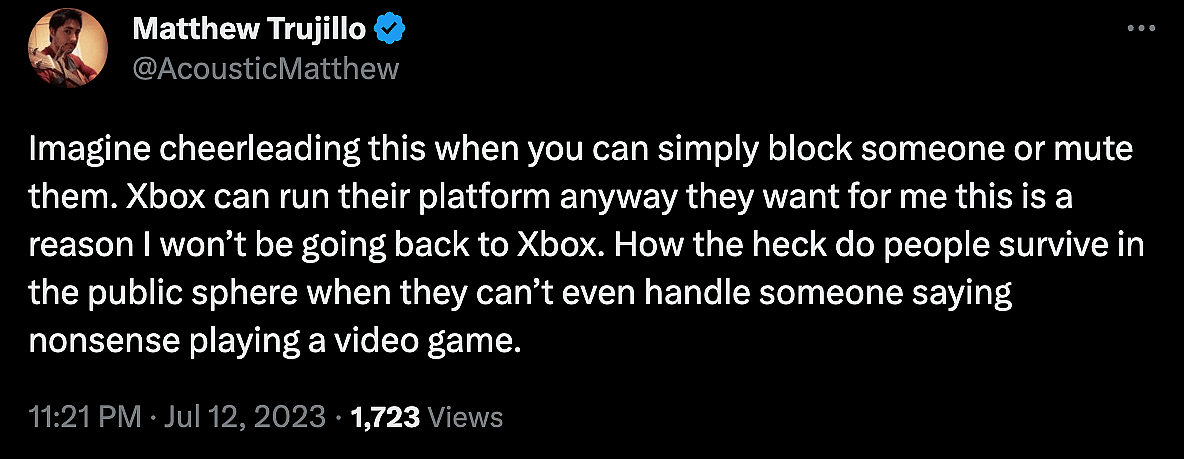Microsoft Launches New Moderation Program That Allows Players To “Capture And Report Inappropriate Voice Activity On Any Multiplayer Game With In-Game Voice Chat”

Microsoft is launching a new moderation program to tackle what they view as a longstanding issue when it comes to multiplayer voice chats.

According to the official press release, Microsoft’s new voice reaction moderation program “allows players to capture and report inappropriate voice activity on any multiplayer game with in-game voice chat on Xbox Series X|S and Xbox One.”
The document also reveals that players can capture up to 60 seconds worth of in-game voice chat when — content that they deem to be in violation of their community guidelines.
“If a player experiences something in our community that they don’t like and they want to report that to us, they have a variety of different options for doing that,” Xbox GM of Trust and Safety Kim Kunes told The Verge. “We do moderation proactively on text, on images, and videos, and launching reactive voice moderation is about that audio portion of it.”

Kunes reassured that the program’s recording and clips specs were designed specifically to guarantee Xbox does not actively listen to, upload, or store player voice chats to the Cloud.
She further noted, “Recording is strictly done through the reporting functionality, and it’s only available for moderation purposes,” adding, “So it’s not something that the player can save or share separately from that reporting mechanism to us.”
Xbox’s official press release explicitly states all clips captured using the “voice reporting feature are only for content moderation.” Hence the captured clips “will not appear in your recent captures nor can the clips be downloaded, modified, or shared.”

The press release stipulates that clips will be deleted “24 online hours” after being captured, with Xbox reminding players to submit a report before these expire. If the player has not submitted a report within the 24 online hour period, “the clip will be erased from your console automatically.”
Kune also mentions that, instead of going through an algorithm, all reported clips are reviewed by human moderators, including official Xbox staff and Xbox Insiders, further noting that players who have been reported can submit an appeal.

“We recognize that things evolve over time, and we need to continue to shift our approach and our processes to ensure that there is a fair review and appeals process,” Kunes explained.
She then pointed out, “We want to get some more feedback from our insider group. And then once we have that data, we will finalize our plan for a wider rollout over the coming months.”
Xbox’s reactive voice reporting feature is currently available in English to Xbox Series X|S and Xbox One players via the Xbox Insiders program in the US, Canada, Great Britain, Ireland, Australia, and New Zealand.

While the press release does not specify what happens to reported players, the Community Standards for Xbox site stipulates that “Every suspension or other corrective action aims only to show what was wrong and what can be learned from a situation.”
“When suspensions end, we welcome players back so they can contribute to the Xbox community in positive ways,” it adds. “We know people make mistakes, and we believe lapses in judgment can be significant opportunities for growth.”

Players were quick to condemn Xbox’s new initiative, taking to social media to vent their frustrations and call out the company’s blatant push for censorship in the video game industry.
“I’ll be using outside apps to talk from now on,” was @TipsyRaider’s response to this new moderation feature.

“The trash talk that I grew up with on Xbox Live playing Halo 2 in 2004 made me the man I am today,” declared @Murderstorm117, adding, “It’s a shame how sensitive people are now.”

Twitter user @realgallowspole weighed in, asserting, “All you are enhancing is big brother and trying to control behavior, which will never happen. We’re imperfect humans so stop trying to perfect us.”

“Imagine cheerleading this when you can simply block someone or mute them,” pointed out @AccousticMatthew. “Xbox can run their platform anyway they want for me this is a reason I won’t be going back to Xbox.”
He then added, “How the heck do people survive in public sphere when they can’t even handle someone saying nonsense playing a video game.”

A fairly valid point was brought forward by @LokiJarson, who noted, “So, what’s the ratio of false reports to true ones going to be? AI reviewed or human reviewed? Automatic band or benefit of the doubt?”
“Potential for disaster,” the user concluded.

Keeping things simple, Twitter user @Marley_Q didn’t waste any time and proceeded to handle Xbox an “L.”

What do you make of Microsoft’s new moderation program? Let us know your thoughts in the comments section down below.
